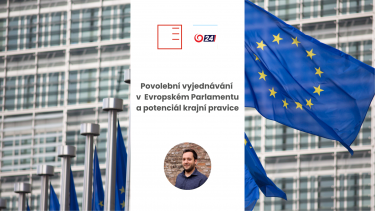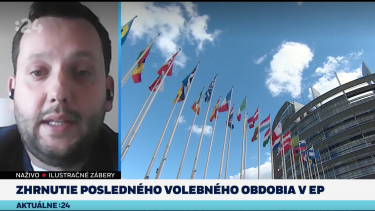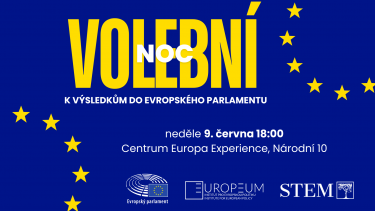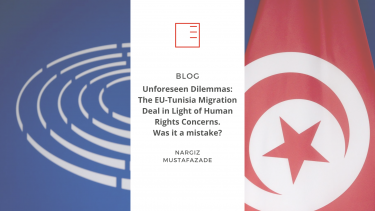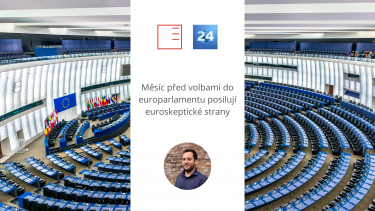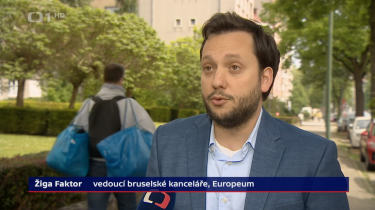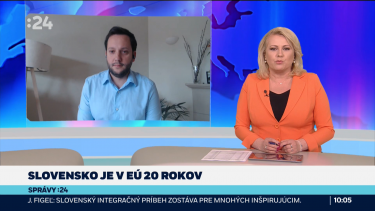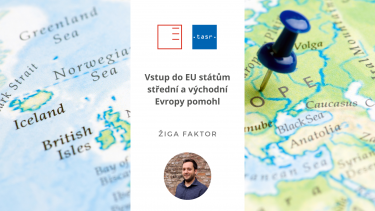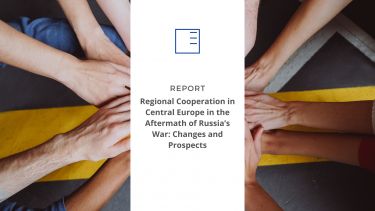JOJ24 | Post-election negotiations within the European Parliament and the potential of the far right
The far right is often disunited, as it lacks electoral discipline and prioritizes its own interests of national politics over its political group. In an interview for the Slovak television JOJ24, Žiga Faktor, Deputy Director and Head of the Brussels Office of EUROPEUM Institute, describes the role European Conservatives and Reformists and the far right from the Identity and Democracy Group could play in coalition building.
Show more
RTVS | The Last Parliamentary Term in the European Parliament
What was the last parliamentary term like in the European Parliament? How did it manage two crises – the war in Ukraine and COVID-19? And how can the aid to Ukraine be assessed? Žiga Faktor, Deputy Director and Head of the Brussels Office of EUROPEUM Institute, answers these and other questions in an interview for Slovak television RTVS.
Show more
Election night on the results of the European Parliament elections
We invite you to the event organized by the European Parliament Office in the Czech Republic, EUROPEUM Institute for European Policy and STEM Institute for Empirical Research. The evening will include two debates on the evaluation of the European Parliament and what challenges await the new one and the European elections and the future of Europe. Speakers include former MEP Pavel Telička and Vendula Kazlauskas from the Association for International Affairs. More information and a detailed programe of the evening can be found below.
Show moreBLOG | Unforeseen Dilemmas: The EU-Tunisia Migration Deal in Light of Human Rights Concerns. Was it a mistake?
Tunisia has become the main exit point for asylum seekers and refugees, especially those from sub-Saharan Africa. The EU, faced with a surge in arrivals to Lampedusa, has bolstered its cooperation with Tunisia, signing a Memorandum of Understanding with President Kais Saied. However, questions arise over the EU's handling of human rights abuses in Tunisia, reminiscent of past agreements with Turkey. Nargiz Mustafazade, a trainee in the Brussels office of EUROPEUM Institute, writes about this topic in her blog.
Show moreČT24 | Euroskeptic parties strengthen a month before the European Parliament elections
The European elections are about a month away. Czechs will vote for 21 of the 720 MEPs. This will be the first election since Brexit, the Covid-19 pandemic or the start of the Russian invasion of Ukraine. Turnout is expected to be higher than in the last elections five years ago, with right-wing and Eurosceptic parties strengthening. Žiga Faktor, deputy director and head of EUROPEUM Institute's Brussels office, described the possible reasons for daily broadcast of Czech TV.
Show more
ČT24 | The rise of the far-right in the EU elections
What are the reasons for the rise of the far-right in the upcoming European elections? Can we say that the far-right still holds anti-European views? What would the agenda of the European Parliament look like if the far-right gained more support? How likely is it that the European People's Party and Liberals would cooperate with the Conservatives? Žiga Faktor, deputy director and head of EUROPEUM Institute's Brussels office, provided live answers on the program "Předvolební Evropa" on ČT24.
Show more
Události | Why is Euroskepticism and the far-right rising in EU elections?
In the forthcoming European elections, projections suggest that the European People's Party and the Socialists will likely hold their ground. However, a competitive scenario arises for the third spot as liberals confront rising of Eurosceptic and far-right parties. What drives voter behavior towards these political parties? Žiga Faktor, deputy director and head of EUROPEUM Institute's Brussels office, answered for main evening broadcast Události at Česká televize.
Show more
RTVS | Slovakia has been in the EU for 20 years
Slovakia joined the European Union 20 years ago in its biggest enlargement to date. Among the main benefits of this move is an increase in the economy, up to 80%. Žiga Faktor, deputy director and head of EUROPEUM Institute's Brussels office, described the future direction of the Union.
Show more
TASR | EU accession helped Central and Eastern European countries
In 2004, a total of ten new countries joined the European Union, the largest enlargement in terms of population and number of countries. EU accession has helped the countries of Central and Eastern Europe, especially in terms of economic growth and political stabilisation. Žiga Faktor, Deputy Director of EUROPEUM Institute and Head of the Brussels Office, commented on this topic.
Show more
Report | Regional Cooperation in Central Europe in the Aftermath of Russia’s War: Changes and Prospects
On April 18th, EUROPEUM’s Brussels Office in partnership with PISM Brussels Office under the Think Visegrad platform hosted a discussion titled “Regional Cooperation in Central Europe in the Aftermath of Russia’s War: Changes and Prospects”. This event was attended by 15 experts from think tanks and representatives of EU institutions.
Show moreStaroměstské náměstí 4/1
Prague 1 - Staré Město
110 00
tel.: +420 212 246 552
email: europeum@europeum.org
https://www.europeum.org
